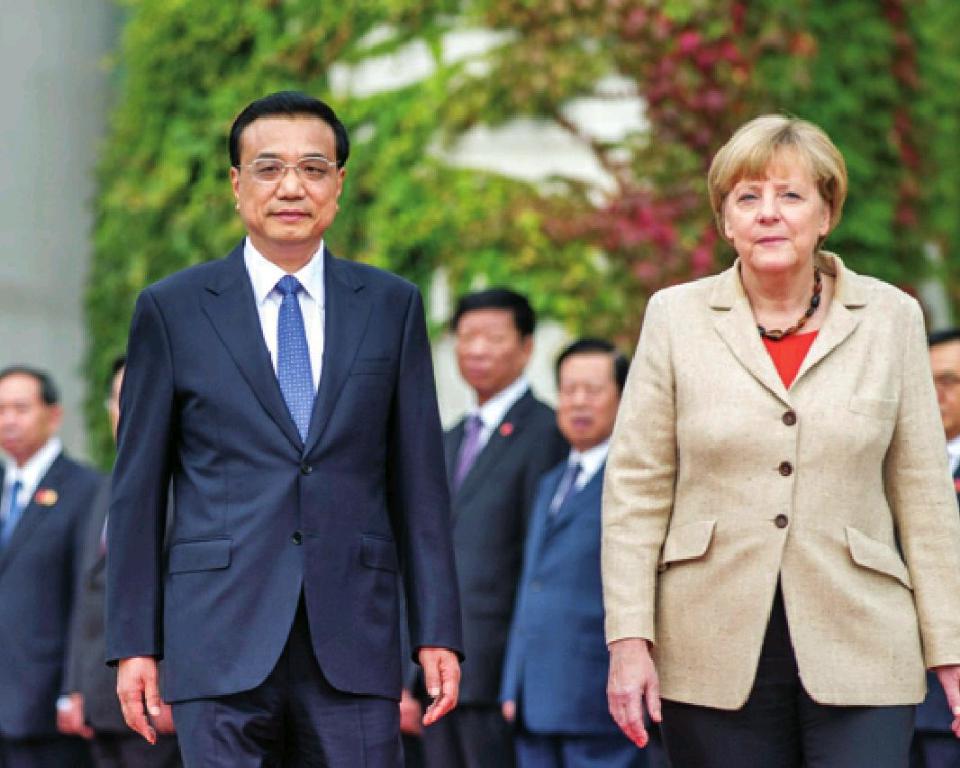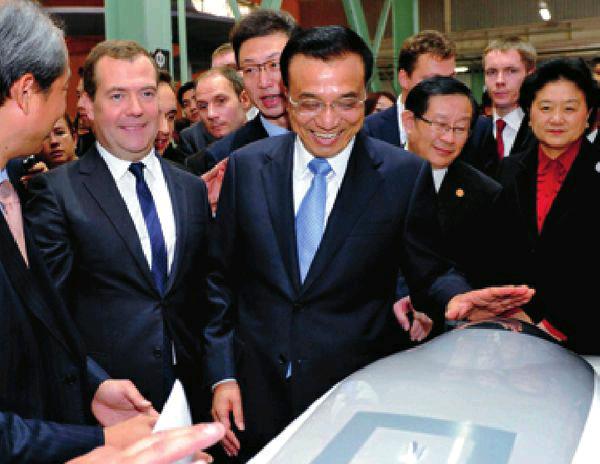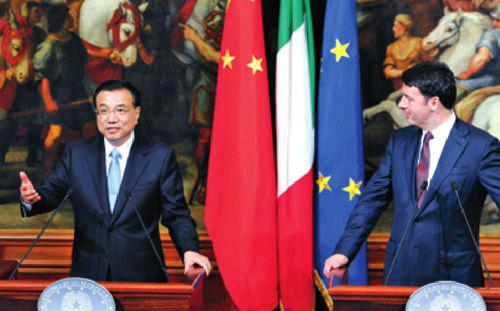Innovative Diplomacy
2014-11-10ByBaiShi
By+Bai+Shi
Chinese Premier Li Keqiang paid an official visit to three European countries—Germany, Russia and Italy—between October 9 and 18.
In addition to a good number of diplomatic talks during the visit, Li attended the third round of China-Germany Governmental Consultations in Berlin, the 19th ChinaRussia Prime Ministers Regular Meeting in Moscow and the 10th Asia-Europe Meeting(ASEM) Summit in Milan in that order.
“various regular meeting mechanisms have played an important role in Chinese diplomacy. Regular high-level meetings can make sure consensus and agreements reached by leaders are implemented on schedule,” said xiong Wei, an associate professor at the China Foreign Affairs University in Beijing.
Compared with other forms of consultation, the regular meeting mechanism has a strong advantage, according to Cui Hongjian,Director of the Department for European Studies under the China Institute of International Studies(CIIS). “At a regular meeting, both sides will not only engage in discussion to resolve issues but also map out a plan for the future. If the two sides reach consensus on many issues, they are then willing to make efforts to realize their objective,” he said.
“Furthermore, the prime ministers regular meetings have always been characterized by a high degree of efficiency. Co-chaired by two prime ministers, departments of the two cabinets talk to each other directly. Both sides can find a solution to a problem or resolve a difference promptly at such a meeting,” Cui said.
Innovative partnership
On October 10, Li and German Chancellor Angela Merkel jointly announced plans to build an innovative partnership of mutual benefit with emphasis on innovation cooperation at a press conference in Berlin.
An action plan was issued following the Li-Merkel meeting, which sets out the main areas of China-Germany innovative cooperation, including a Germany-initiated strategic hi-tech project dubbed “Industry 4.0,” as well as urbanization, industrialization, information technology and agricultural modernization, which are among Chinas policy priorities.
According to Chinese Ambassador to Germany Shi Mingde, Germany will be the first country to develop all-round innovation cooperation with China.
At the seventh Sino-German Forum for Economic and Technological Cooperation on October 10, Li presented a small gift to Merkel—the Lu Ban Lock—which is a traditional Chinese puzzle.
The metal Lu Ban Lock was made by three Chinese students of Tianjin SinoGerman vocational and Technical College with a German-brand machine tool. Lu Ban was the originator of the handicraft industry and a great inventor in ancient China.
The gift symbolizes Lis wish to combine Chinese wisdom with German technologies and advance the common development of the two giant manufacturing countries, xinhua News Agency commented.
Feng Zhongping, Deputy Dean of the China Institutes of Contemporary International Relations, said that the emphasis on innovation cooperation and the new action plan shows the strong willingness for cooperation by Chinese and German leaderships as well as the broad common interests of the two countries.
Innovation was also highlighted during Lis visit to Russia and Italy. The Chinese premier attended an international forum themed open innovation in Moscow on October 14. In Italy, he attended the “innovation week” meeting with Italian Prime Minister Matteo Renzi.
The innovation partnership is not exclusive to Germany, Cui said. He added that Chinas call to building innovative bilateral relations covers a broad space and other European countries can benefit from the new partnership.
Since he assumed office as Chinese premier, Li has continually emphasized the crucial role of innovation in Chinas development.
In May, Li vowed to make innovation the strong impetus for driving the Chinese economy to upgrade, in his speech at the opening ceremony of the third annual meeting of the Global Research Council in Beijing.
diversified cooperation
Lis visit to Russia saw the signing of 39 cooperation agreements in broad fields between the two countries, including natural gas supply, high-speed railway construction, currency swap, high technology and finance.
Chen yurong, Director of the Department of Eura-Asia Research under the CIIS, told xinhua News Agency that China-Russia cooperation is not limited to energy.
Chinas central bank has signed a currency swap agreement worth 150 billion yuan ($24 billion) with the Russian central bank, which will facilitate bilateral trade and investment between China and Russia.
Deepening cooperation on finance and currency is a major direction for China and Russia at present. With this agreement, enterprises of the two countries are able to complete transactions more conveniently, Chen said.
Today, China is recovering the prosperity of its old industrial base in the northeast and Russia is making efforts to develop its Far East region. The two neighboring regions have a strong thirst to do business. As a result, the demand for currency swaps is increasing, Chen said.
She added that a planned Eurasian highspeed transport corridor linking Beijing and Moscow which will promote people-to-people exchanges for the two giant neighbors.
This year marks the 10th anniversary of the establishment of the China-Italy comprehensive strategic partnership.
During Lis visit, the two countries also inked a slew of new cooperation documents on trade, investment, infrastructure construction, energy, finance and innovation.
Speaking at a joint press conference on October 14 with his Italian counterpart Renzi, Li stressed that China and Italy, both heirs to great ancient civilizations, enjoy inborn advantages in people-to-people exchanges, and the two sides should continue to deepen cooperation in culture, education and tourism.
China-EU ties
The 10th ASEM Summit in Milan on October 16-17 was an important multilateral diplomatic event for China this year. And it was the first time that Li has attended this biennial meeting.
The first ASEM Summit was held in Bangkok, Thailand, in 1996. It currently serves as the highest-level dialogue mechanism existent between Asia and Europe. Today, the meeting mechanism consists of 20 Asian states and 31 European states, which account for over half of the world economy and 60 percent of the global population.
As an original member state, China attaches importance to ASEM and has made a valuable contribution to the development of the mechanism. China regards it as an important platform for cementing diplomacy with neighboring countries, expanding cooperation space and maintaining good ties with both Asian and European countries.
The Chinese premier attended every ASEM summit. The country has put forward a good many practical proposals in successive meetings and it has held the most ministerial meetings of any member country.
Cui said that China hopes ASEM will not remain solely a multilateral forum and suggests it grow to be a permanent mechanism, playing a bigger role in promoting coopera- tion between Asia and Europe.
Li promoted Chinas proposal for building the Silk Road Economic Belt and the 21stCentury Maritime Silk Road with other countries at this years ASEM Summit. China hopes the proposal can facilitate international cooperation, boost mutual trust, lift communication and transport conditions and promote an inclusive and sustainable development for Asian and European countries.
At the sixth Hamburg Summit of the ChinaEurope Forum on October 11, Li expounded on the Chinese Governments policies and views on domestic economic development, opening up and China-EU ties, which will encourage more EU investment in the Chinese market.
Li stressed that China will continue to open its doors to the outside world, providing more market opportunities. China will strive to lower market access thresholds, strengthen intellectual property rights protection, and create a fair, transparent and orderly market environment for foreign companies operating in the country.
Opening up is a foundation of cooperation and Chinas state policy. The opening up of the Chinese market will benefit not only China but also the rest of the world. Lis speech will enhance the confidence of EU entrepreneurs, said Mei Zhaorong, former Chinese Ambassador to Germany.
According to Chinas Ministry of Commerce, China is the second largest trading partner of the EU, which in turn has been the largest trading partner of China for 10 consecutive years. On average, the trade volume between China and the EU constitutes $1.5 billion every day.
China and the EU set a goal to reach $1 trillion in trade by 2020. The two sides issued the China-EU 2020 Strategic Agenda for Cooperation and launched negotiations on an investment agreement covering nearly 100 fields last year.
The EU plans to invest 50 billion euro($64 billion) in transportation, energy and digital networks. China has a comparative advantage in high-speed railways and nuclear power technology, which could facilitate innovation cooperation between the two sides, Mei said.
When meeting with Prime Minister of Luxembourg xavier Bettel prior to the Hamburg summit, Li said that China supports the establishment of an offshore RMB market in Luxembourg and the use of national currencies in the two-way trade and investment.
